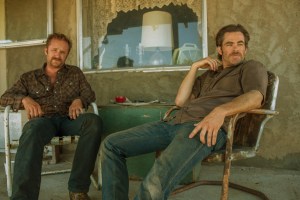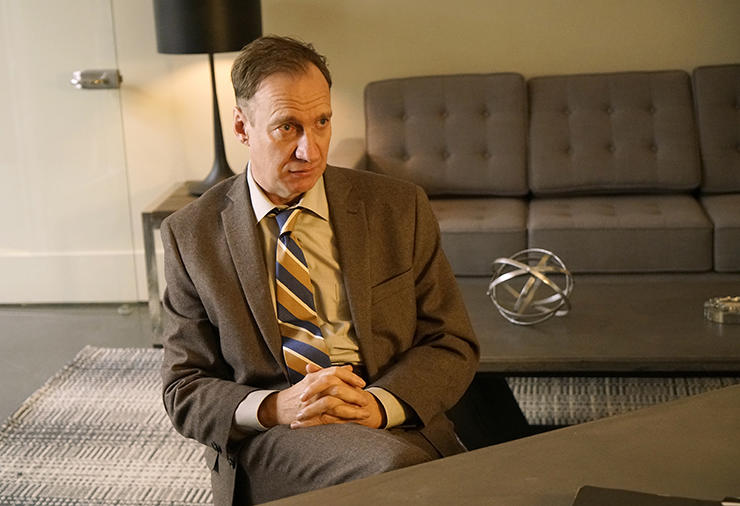“And as through your life you travel,
Yes, as through your life you roam,
You won’t never see an outlaw
Drive a family from their home.”
-Woody Guthrie, “Pretty Boy Floyd”
Capitalism and American crime fiction have always been intertwined because greed and crime have always been intertwined.
Not all crimes are motivated by money and neither is all crime fiction. That said, the genre, and the noir genre in particular, spun some of its finest work out of the unbearable, hot-cold stress that comes from the problem of needing money and having no honest way to obtain it, from Double Indemnity to Breaking Bad. American culture has always revered the successful businessman, but because so many of us know that stress, we’ve always revered the people who took the money they wanted or needed as well; legend has it that when the Depression-era bank robber and folk hero Willie Sutton was asked why he robbed banks, he responded “because that’s where the money is.”
Much has been written about how the 2008 financial crisis and our still-limping recovery from it changed American politics forever, but it changed our culture forever as well. In the Great Depression, the people saw outlaws and gangsters in the news and made them heroes; now, thanks to the Internet, we know what everyone looks like, and if there’s such a thing as a “folk villain,” that’s what people like pharmaceutical executive Martin Shkreli are. In the past decade, a new strain of crime fiction with a distinctly anti-capitalist spirit has developed.

(image: Lionsgate)
Last year’s excellent neo-Western Hell or High Water has a fairly conventional plot at first glance: the Howard brothers (Chris Pine and Ben Foster) rob a series of banks to save their ranch, pursued all the while by an aging Texas Ranger (Jeff Bridges). Beneath the surface, however, there’s far more going on: the Howards are specifically hitting branches of the bank that holds their reverse mortgage. What they’re doing is illegal, but it’s hard to call it immoral, much like the bank’s tactics are legal but far from moral.
The film has its share of violence, but its most intense moments don’t involve gunplay but a slower-acting, more institutional violence. In one of the movie’s most harrowing scenes, a waitress (Katy Mixon) refuses to relinquish the tip the brothers left her (in stolen money, of course) to Bridges because she needs it to keep a roof over her daughter’s head. Thrillers often make us feel anxious even if crime or espionage aren’t experiences we’re familiar with, and post-crisis, nearly everyone knows the dark, raw fear of not having enough to get by.
FX’s celebrated anthology series Fargo, meanwhile, has always drawn parallels between criminals and “legitimate” businessmen, with the crime syndicate that rolls into Minnesota in the series’ second season organized like a typical white-collar firm. In its recently concluded third season, however, creator Noah Hawley made the connection explicit with its central antagonist, V.M. Varga (David Thewlis).

(image: FX)
Varga, a mysterious corporate middleman, is one of the most viscerally repulsive villains on modern television, constantly leering and flashing a mouthful of teeth that look like a better fit for a Pirates of the Caribbean movie. He’s also described in the show’s promotional materials as “a true capitalist,” and is introduced forcibly partnering with parking-lot tycoon Emmett Stussy (Ewan McGregor) in repayment for a startup loan.
This move confuses Emmett, who assumes Varga simply wants his loan repaid, but it becomes clear that Varga is not out to simply turn a profit but to hollow out the people he partners with, using an array of surveillance tools to worm his way into their personal lives and learn everything about them even as they know nothing about him. The punchline comes when his nemesis Deputy Gloria Burgle (Carrie Coons) and an IRS agent are given documentation of his business dealings and find that while he’s committed tax fraud, everything else he got up to (on paper) was legal, a corporate strip-mining akin to what Mitt Romney did during his time at Bain Capital. Joel and Ethan Coen, the writer-directors of the original Fargo film, often employ a Satanic figure as an antagonist, but Varga is a reminder that the devil doesn’t simply take your soul; he buys it. As Will Menaker, host of the leftist podcast Chapo Trap House, put it:
First and last scene of s3 Fargo implies under socialism the state decides the truth and under capitalism criminals do
— Will ? Menaker (@willmenaker) June 27, 2017
The times we live in create our villains, be they the Nazis Captain America made his bones fighting, the terrorists of post-9/11 action and spy cinema, or even something as seemingly mundane as the self-justifying misogynists and gentrifiers of Jessica Jones and Daredevil. And in a climate where people are kept up at night by fear of losing their home or healthcare, our cultural villains will be the people who try to take them, especially when they can do it without breaking any of man’s laws.
(featured image: FX)
Zack Budryk is a specter haunting Northern Virginia. His first novel, Judith, is now available.
Want more stories like this? Become a subscriber and support the site!
—The Mary Sue has a strict comment policy that forbids, but is not limited to, personal insults toward anyone, hate speech, and trolling.—









Published: Jul 7, 2017 01:52 pm